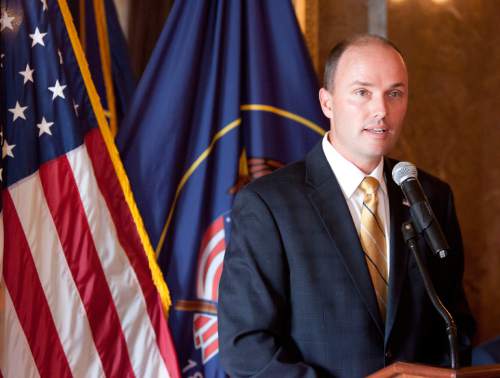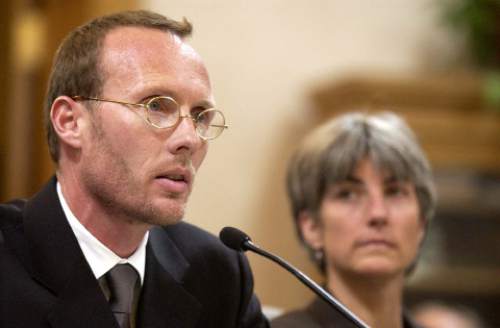This is an archived article that was published on sltrib.com in 2015, and information in the article may be outdated. It is provided only for personal research purposes and may not be reprinted.
Utah Lt. Gov. Spencer Cox blocked a petition drive seeking to limit terms for appointees to hundreds of state boards by ruling Thursday that it is "patently unconstitutional." Drive organizers say they may challenge the rejection in court.
The action by Cox does not affect a separate push to limit the terms of top elected state officeholders to no more than eight years.
Cox wrote to organizers of Utah Term Limits NOW! saying that the Utah Constitution gives the governor authority to appoint people to numerous boards and commissions, and "any change or limit to that authority requires a change to the Constitution."
The group proposed a mere statutory change, not a constitutional amendment — which cannot be sought through such a petition drive to put an issue on the ballot.
So Cox said that after consultation with the Utah attorney general's office, he "determined the proposed initiative is patently unconstitutional" and rejected it.
Mark Thomas, chief of staff to Cox, said, "The appropriate way to make that change would be through the constitutional-amendment process."
Stephen Clark, attorney for the term-limits group, argues that Cox is mistaken, and said he is exploring whether to challenge the ruling in court.
"The Utah Constitution expressly vests in the people all political power and expressly grants them the right to 'alter or reform their government as the public welfare may require,' " Clark said. And his group "views this as an exercise of a power that is expressly vested in the people."
He said laws allow Cox to reject a petition if it clearly is "patently unconstitutional." But he says he is not aware of any court decision on term limits for appointees, so at most it is "an argument ... that under normal circumstances would be resolved by the courts" if the initiative passes.
"That's the role of the courts, not the executive," he said.
The term-limits group already has been asking the Legislature to pass and send to voters a state constitutional amendment to limit terms for the governor, lieutenant governor, attorney general, auditor and treasurer to two consecutive four-year terms.
Clark said it went that route for such elected officers "out of an abundance of caution" because various court decisions disagree about whether term limits can be imposed by simple statute instead of a constitutional amendment.
He said while some courts ruled that term limits add to constitutional requirements of elected officials, and thus required a constitutional amendment, "the Constitution doesn't identify any qualifications for appointed officials. So we think it is left up to the people to identify those qualifications."
Rick Larsen, organizer of the term-limits group, said, "Anyone who doubted the need for term limits aimed at entrenched power in Utah should take a very careful look at what's happening in Utah today."
Larsen previously said the group believes limiting terms is healthy and "it brings new ideas. I think it disrupts entrenched power where decisions are no longer transparent or decisions are based on re-election. I just think it's good for democracy."
He noted that the U.S. Constitution limits the U.S. president to no more than two terms, and 36 other states also limit terms for governors.
Larsen has said the push for term limits is not in reaction to any current officeholder, but seeks to curb what James Madison called a lust for power that comes with long service. "It's not about anybody or any office. It's about human nature."
The group has not sought term limits for Utah's part-time legislators. Also, the U.S. Supreme Court has ruled that states cannot impose term limits on members of Congress.
Utah has seen a variety of efforts to limit terms through the years, including one term-limits law passed by the Legislature that was repealed before it actually had any effect.
In 1994, political maverick Merrill Cook pushed a voter initiative to limit terms, which appeared to have broad public support. Legislators short-circuited that effort by passing a less-strict limit. The law was repealed in 2003 before preventing a single person from seeking re-election.





